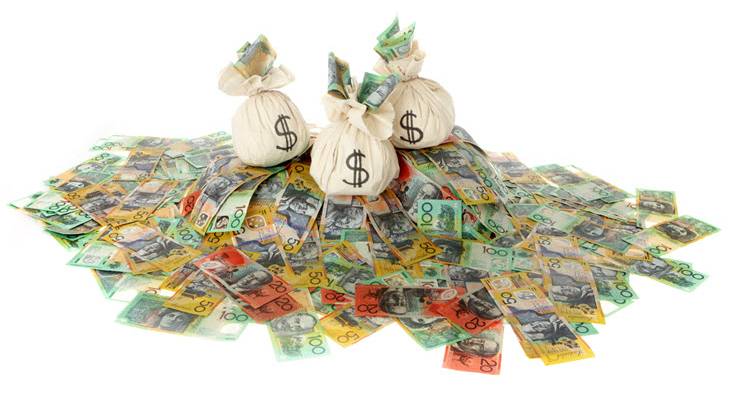
Ever wondered how much Clive Palmer spent on the 2019 election campaign?
That question will be answered, along with many others, at 9am on Monday when the AEC does its annual political donations dump, this time for the 2018-19 financial year. Watch for it here.
The ASX profit reporting season also kicks off in earnest next week where investors will be told how companies performed in the six months to December 31, 2019.
While public companies must report on a six-monthly basis no later than two months after the books close, political donors and political parties only have to file threadbare annual returns, and these are not disclosed until six months after year end. Some of the donations disclosed on Monday will be as much as 19 months old.
Crikey has reported time and again about Australia’s woeful donations transparency, but the same can’t be said for the rest of the media, particularly News Corp, which doesn’t seem to have any problem with our opaque “anything goes” campaign finance system.
Even the ABC’s major programs — particularly AM and 7.30 — have in the past been missing in action on donations day, as was documented by Crikey in 2016.
The main focus on Monday should be who funded the May 2019 federal election, but there was also a Victorian election in November 2018.
The Age reported last year that the Australian Hotels Association gave close to $1 million to the major Victorian parties in order to block the anti-pokies policies of the Greens. We’ll get the precise figures on Monday.
One reason that the coverage falls short each year is because when the out-of-date data is dumped on the AEC website at 9am, few political players or donors bob their heads up to talk about it.
The data is also incomplete.
For instance, if a sporting club that received a grant wanted to donate something back to the National Party, this would only be disclosed if it was above the 2018-19 threshold of $13,800. This threshold will rise to $14,000 in 2019-20.
To illustrate just how incomplete these disclosures are, consider this 2015-16 return filed by the Victorian Nationals — home branch of the besieged Senator Bridget McKenzie — which declared total revenue of $841,596 but only disclosed four sources of those funds totalling $109,327. None of them were external donors.
This means that $732,269, or some 87% of total revenue, was not disclosed. Most of this would have been revenue from donations, events and fundraisers where the individual contribution was less than the $13,000 disclosure threshold that applied that year.
It’s not much a system for political party members either because all they are told is how much money came in, how much was spent and the size of any debts as of June 30.
Parties don’t even have to reveal consolidated, let alone audited, balance sheets for their members. This is partly how the ALP is able to get away with amassing a little-known asset pile of almost $100 million derived from its various pokies operations in Canberra and New South Wales.
There is still much clamouring for a federal ICAC but arguably the more important reform is faster disclosure, limitations and better regulation of campaign donations, which at the moment are completely unlimited from domestic sources.
A federal ICAC inquiring into federal donations would go a long way towards addressing federal rent-seeking and corruption.
The lack of any spending caps, a major feature in many democracies including Britain, will be evident on Monday when we see Clive Palmer’s United Australia Party annual return which is likely to show political spending exceeding $50 million in 2018-19, much of it dedicated to attacking Bill Shorten and Labor.
Public companies have been easing back on their political donations in recent years, but nothing like the collapse in donations in the UK after the law was changed to require shareholder approval for any contributions.
The Hayne royal commission is expected to have caused a substantial drop in bank donations, but it would be better all round if federally licensed institutions, such as banks, telcos and television companies, had a licence condition that prevented any political donations being made.
Rather than staying on board the lax federal system, NSW, Queensland and, most recently, Victoria have all moved to faster state-based disclosure laws, so Monday will be the last time all the Victorian data is released simultaneously with the Commonwealth.
As for any restrictions on federal donations, foreigners are now banned but the legislation was only passed in November 2018 so Monday’s data could still include some foreign donations, although historically they’ve only comprised about 6% of the total.
From a media perspective, the biggest splash caused by donations last year was around the NSW ICAC inquiry into the $100,000 of cash allegedly handed over to Labor by the now banned Chinese billionaire Huang Xiangmo, using his famous Aldi bag.
Banished to Hong Kong and in dispute with the ATO, he certainly won’t be donating again, but Monday’s data is so old we may yet get one final update on his past generosity.








Crikey is committed to hosting lively discussions. Help us keep the conversation useful, interesting and welcoming. We aim to publish comments quickly in the interest of promoting robust conversation, but we’re a small team and we deploy filters to protect against legal risk. Occasionally your comment may be held up while we review, but we’re working as fast as we can to keep the conversation rolling.
The Crikey comment section is members-only content. Please subscribe to leave a comment.
The Crikey comment section is members-only content. Please login to leave a comment.